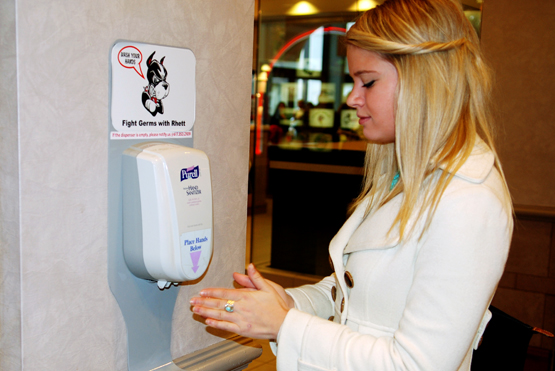The Flu Is Here, but Not the Vaccine
University awaits shipments as victims recover

On the first day of his summer job, Alec Nicholson awoke with a sore throat, fever, and muscle aches. His symptoms worsened throughout the day; hours later he was in bed, coughing and shivering.
Nicholson (CAS’12) believes he had H1N1, commonly referred to as swine flu. “I caught it from a friend who had been vaccinated against seasonal flu,” he says. “The good thing about having swine flu last summer is that I’m immune to it now.”
Others aren’t so lucky. With H1N1 vaccination shipments running three weeks behind schedule, many members of the Boston University community remain at risk in what President Obama is now calling a “national emergency.”
“While the University is scheduled to receive shipments of the vaccination,” says Peter Fiedler, vice president for administrative services, “we have no way of knowing when that will happen. We’re basically at the mercy of the suppliers.”
Shipments are not on schedule because of production backups, according to the Boston Public Health Commission. National reports indicate that this particular virus cultures more slowly than others, delaying vaccine production. The city’s allotment of 27,000 doses has gone to health-care providers in hospitals, community health centers, and primary care offices to inoculate those at high risk, including pregnant women, children, and health-care workers.
Fiedler says the University hopes to receive approximately 10,000 doses. Employees from Student Health Services (SHS), medical students from the School of Medicine, and paramedics from Samaritan Ambulance will administer the shots, with doctors and nurses monitoring.
“We’re hoping it will be free,” he says. “But we can’t say just yet.”
So far, University health officials have identified 185 cases of what is now being referred to as influenza-like illness (ILI). Because the typical flu season has barely begun, people are assuming that most of these cases are H1N1. The total to date is fewer than originally anticipated. Fiedler credits members of Facilities Management and Planning for the low numbers. “They’ve worked hard to install new towel dispensers, touchless water faucets, and Purell dispensers throughout campus,” he says.
There also has been a run on seasonal flu vaccinations, which likely helps. “We distributed four to five times more vaccinations than in previous years,” Fiedler says.
The University did not begin tracking the numbers of ILI cases until this year, according to David McBride, SHS director. Even so, he is confident there has been an increase. “We are definitely seeing more cases this year,” he says, “We’re very busy, to the point where we’ve had to hire additional staff.”
The University cannot distinguish H1N1 from seasonal flu, but anyone experiencing symptoms likely has swine flu, McBride says. “My guess is that it’s probably going to get worse before it gets better.”
H1N1 symptoms include a fever — generally 103 or higher — body aches, cough, sore throat, and intestinal discomfort. “On average, students are recovering within three to seven days,” he says.
Students experiencing ILI symptoms, regardless of the cause, have begun to isolate themselves, Fiedler adds. “Some have gone home to their parents, and others have readily accepted our isolation plan.” In August, the University set aside 60 rooms for sick students. A larger scale initiative would include setting up a barracks-style infirmary.
Beginning November 1, a nurse will begin visiting sick students in isolation areas. “We want to be sure students are staying hydrated and eating,” Fiedler says, “and that their fevers aren’t spiking.”
To prepare for a potential outbreak, the University has formed an H1N1 influenza task force, which meets weekly. According to Victor Coelho, associate provost for undergraduate education, the committee is working to revise the absentee policy and develop online instructions. Worst case scenarios have to be considered.
“Extremely high rates of absenteeism will call for a greater Web presence,” Coelho says. “Classes will be supplemented with online lectures and podcasts, and professors will be encouraged to post PowerPoint slides, TA notes, and other materials online.”
Students are not required to provide official medical verification for missing class, but should call Student Health Services. As for completing course work and receiving credit, “we’re looking at a whole range of options,” Coelho says, “from extending finals to allowing independent projects to make up for missed tests and labs.”
Vicky Waltz can be reached at vwaltz@bu.edu.
Comments & Discussion
Boston University moderates comments to facilitate an informed, substantive, civil conversation. Abusive, profane, self-promotional, misleading, incoherent or off-topic comments will be rejected. Moderators are staffed during regular business hours (EST) and can only accept comments written in English. Statistics or facts must include a citation or a link to the citation.